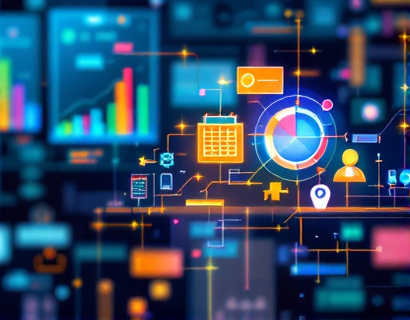Transforming Healthcare Access through AI-Powered Chat Interfaces
In the rapidly evolving landscape of healthcare, the integration of artificial intelligence (AI) has opened new avenues for delivering specialized medical knowledge to a diverse audience. This article delves into the development and implementation of an AI-driven chat interface designed to provide accurate, safe, and accessible healthcare insights for professionals, students, and the general public. The focus is on creating a platform that not only serves as a reliable resource for healthcare information but also includes a child-friendly version to facilitate educational exploration among younger audiences.
Understanding the Need for Specialized Healthcare Insights
The healthcare industry is complex and ever-changing, making it essential for various stakeholders to stay informed about the latest developments. Healthcare professionals require up-to-date knowledge to provide the best possible care, while medical students need comprehensive resources to build their foundational understanding. For parents and the general public, access to reliable healthcare information can empower better health decisions and promote preventive care. However, the challenge lies in ensuring that this information is not only accurate but also presented in a manner that is accessible and safe for all users, including children.
AI-Driven Chat Interfaces: A Solution for Reliable Information
An AI-driven chat interface serves as an innovative solution to these challenges. By leveraging natural language processing and machine learning, such a platform can provide users with specialized healthcare insights through conversational interactions. The AI is trained on a vast dataset of medical information, ensuring that the responses are not only relevant but also accurate. This technology enables users to ask questions, seek clarifications, and gain a deeper understanding of various healthcare topics in real-time.
Ensuring Accuracy and Safety
A critical aspect of any healthcare information platform is the accuracy and safety of the content provided. To address this, the AI chat interface undergoes rigorous content verification processes. Medical experts review and validate the information before it is integrated into the system. This multi-layer verification ensures that users receive reliable and trustworthy data. Additionally, the platform continuously updates its knowledge base to reflect the latest medical research and guidelines, maintaining its relevance and utility.
Features for Professionals and Students
For healthcare professionals, the chat interface offers a comprehensive resource for staying updated on the latest medical advancements, treatment protocols, and industry trends. Users can engage in conversations to get detailed explanations of complex medical conditions, explore treatment options, and understand the latest research findings. This interactive approach enhances learning and can serve as a valuable supplement to ongoing medical education.
Medical students benefit equally from this platform. The chat interface provides a structured and accessible way to explore various medical specialties, learn about different procedures, and understand patient care protocols. The conversational format makes complex information more digestible, aiding in the retention of knowledge. Students can also use the platform to simulate real-world scenarios, practice decision-making, and gain insights into the day-to-day activities of healthcare professionals.
Child-Friendly Version for Educational Exploration
Recognizing the importance of early education in healthcare, the platform includes a child-friendly version. This version simplifies medical concepts, uses age-appropriate language, and incorporates interactive elements to engage young learners. Parents and educators can use this feature to introduce children to basic healthcare knowledge, fostering a curiosity and understanding of the human body and health practices from an early age. The child-friendly version ensures that even the youngest users can explore healthcare topics safely and effectively.
Enhancing User Experience for the General Public
For the general public, the AI chat interface serves as a go-to resource for understanding various health-related topics. Users can ask questions about symptoms, diseases, preventive care, and wellness practices. The AI provides clear, concise answers, often directing users to additional resources or recommending they consult a healthcare professional for more detailed advice. This approach demystifies healthcare information, making it more approachable and empowering individuals to take charge of their health.
Interactive and Personalized Interactions
The chat interface is designed to be interactive and personalized. Users can ask follow-up questions, seek clarifications, and even request examples or analogies to better understand complex concepts. The AI's ability to recognize context and previous interactions ensures that each conversation is tailored to the user's needs and level of understanding. This personalized approach enhances user satisfaction and encourages repeated use of the platform.
Technical Foundations and Implementation
The development of an AI-driven chat interface for healthcare involves several technical components. At the core, the system utilizes advanced natural language processing (NLP) algorithms to understand and generate human-like text. Machine learning models are trained on a diverse dataset of medical literature, clinical guidelines, and expert opinions to ensure the accuracy and relevance of the responses. The platform also incorporates user feedback mechanisms to continuously improve the AI's performance and adapt to evolving medical knowledge.
From a technical standpoint, the chat interface is built using a combination of cloud-based services and robust server infrastructure to handle high volumes of user interactions. Security measures, including data encryption and user authentication, are implemented to protect sensitive information and ensure compliance with healthcare regulations such as HIPAA. The platform is designed to be accessible across various devices, including smartphones, tablets, and desktop computers, ensuring broad reach and usability.
Integration with Healthcare Systems
To maximize its utility, the AI chat interface can be integrated with existing healthcare systems and platforms. This integration allows for seamless access to patient records, medical histories, and other relevant data, enabling the AI to provide more context-specific and personalized information. For healthcare providers, this integration can streamline workflows, reduce administrative burdens, and enhance patient care coordination. For users, it means receiving more accurate and relevant healthcare insights based on their individual circumstances.
Promoting Health Literacy and Empowerment
One of the most significant impacts of an AI-powered healthcare chat interface is its role in promoting health literacy. By making specialized medical knowledge accessible and understandable, the platform empowers users to make informed decisions about their health. This is particularly important for conditions that are often misunderstood or misrepresented in the media. Users can gain a clearer understanding of their health status, treatment options, and preventive measures, leading to better health outcomes and a more informed population.
Addressing Misinformation
In an era where misinformation can spread rapidly, a reliable healthcare chat interface serves as a counterbalance. The AI's content verification process ensures that users receive accurate information, reducing the risk of misinterpretation or false beliefs. By providing evidence-based answers and directing users to credible sources, the platform helps combat health misinformation and promotes trust in medical expertise.
Future Prospects and Innovations
The potential for AI-driven healthcare chat interfaces is vast, with ongoing advancements promising even more sophisticated and personalized interactions. Future developments may include the integration of multimedia elements such as videos, infographics, and interactive simulations to enhance the learning experience. Additionally, the incorporation of emotional intelligence and empathy in AI responses can make interactions more human-like and supportive, further enhancing user engagement and satisfaction.
Another area of innovation is the use of AI to predict health trends and identify potential health risks based on user interactions and data patterns. This proactive approach can help users and healthcare providers take preventive measures, potentially reducing the incidence of certain conditions and improving overall public health.
Conclusion
The AI-powered healthcare chat interface represents a significant step forward in making specialized medical knowledge accessible and safe for a wide range of users. By ensuring accuracy, safety, and child-friendliness, the platform serves as a valuable resource for healthcare professionals, students, parents, educators, and the general public. As technology continues to evolve, the potential for AI to transform healthcare communication and education is immense, paving the way for a more informed and healthier society.











































